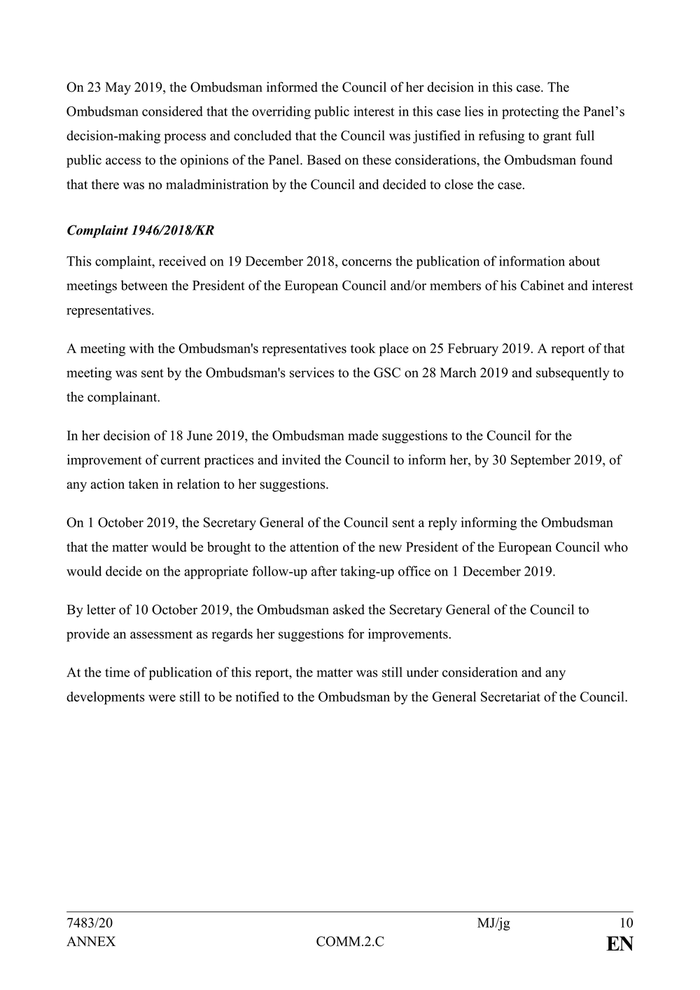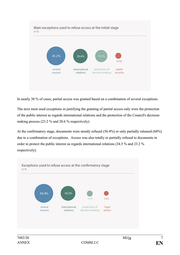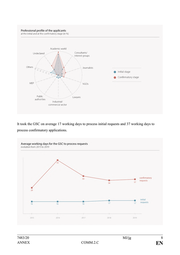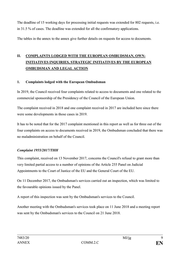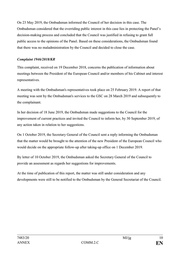st07483en20
Dieses Dokument ist Teil der Anfrage „Working Party on Information documents 2019 and 2020“
Council of the European Union Brussels, 27 April 2020 (OR. en) 7483/20 INF 80 API 57 NOTE From: General Secretariat of the Council To: Working Party on Information Subject: Eighteenth annual report of the Council on the implementation of Regulation (EC) No 1049/2001 of the European Parliament and of the Council of 30 May 2001 regarding public access to European Parliament, Council and Commission documents 1. Delegations will find in the Annex to this note the draft annual report on requests for access to documents for 2019. 2. This report has been drawn up pursuant to Article 17(1) of Regulation (EC) No 1049/2001. It describes trends in requests for access to Council documents in 2019 and reviews complaints to the Ombudsman and rulings given by the European courts in cases concerning the institutions' implementation of the regulation. It is recalled that the statistical data which provides the basis for the report is available as open data on the Council's website. 3. Following the agreement of the Working Party on Information, the report will be submitted to COREPER/Council for approval. ____________________ 7483/20 MJ/jg 1 COMM.2.C EN

ANNEX COUNCIL ANNUAL REPORT ON ACCESS TO DOCUMENTS - 2019 1 I. REQUESTS FOR ACCESS TO DOCUMENTS IN 2019 1. The public register In 2019, the register attracted about 10 % of the Council website's traffic. It was consulted more than 435 350 times. Of more than 375 900 visitors, 27 % arrived at the register through web search engines, 66 % came via a direct link and 5 % were redirected from another website. More than 23 % of the visitors were based in Belgium, 9.3 % in Germany, 8.4 % in the United Kingdom, 7.9 % in Luxembourg and 4.5 % in France. On 31 December 2019, the public register listed 420 763 original language documents (3 109 922 documents including all language versions). Of the total number of original language documents listed in the register, 70.7 % (297 670 documents) were public and available to download. 1 This report has been drawn up pursuant to Article 17(1) of Regulation (EC) No 1049/2001 of the European Parliament and of the Council regarding public access to European Parliament, Council and Commission documents (OJ L 145, 31.5.2001, p. 43), which provides that 'Each institution shall publish annually a report for the preceding year including the number of cases in which the institution refused to grant access to documents, the reasons for such refusals and the number of sensitive documents not recorded in the register'. 7483/20 MJ/jg 2 ANNEX COMM.2.C EN

Throughout 2019, 23 111 original language documents were added to the register, of which 70.9 %, or 16 393 documents, are public and available to download. In 2019, the Council issued 12 720 documents that were available to the public upon circulation and it issued 9 483 LIMITE documents. It added to the register 405 documents that are partially available to the public. In 2019, 908 classified documents 2 were referenced in the register and the Council issued 99 classified documents which are not listed in the register. Legislative documents During the period covered by this report, the Council issued 4 373 legislative documents ,3 of which 1 965 were issued as 'public' upon circulation. Of the remaining 2 408 legislative documents issued as LIMITE (with a reference in the register but not directly accessible), 1 649 documents were made public upon request. 82.6 % of the legislative documents issued in 2019 are thus fully available to the public. 2 As established by Council Decision 2013/488/EU of 23 September 2013 on the security rules for protecting EU classified information (OJ L 274, 15.10.2013, p. 1). 3 As defined in Article 12 of Regulation (EC) No 1049/2001, legislative documents are documents drawn up and/or received in the course of a legislative procedure. 7483/20 MJ/jg 3 ANNEX COMM.2.C EN

2. Requests for access to documents In 2019, the Council received 2 567 initial requests for access to documents and 40 confirmatory applications, which required 8 222 documents to be analysed. 7483/20 MJ/jg 4 ANNEX COMM.2.C EN

At the initial stage, full access was granted to 6 145 documents (74.7 %) and partial access to 470 documents (5.7 %). Access was refused to 1 607 documents (19.5 %). Following confirmatory applications, full access was granted to 61 documents and partial access to 50 documents. The Council confirmed that access should be refused to 55 documents. 7483/20 MJ/jg 5 ANNEX COMM.2.C EN

Exceptions used to refuse access At the initial stage, access was refused to documents mainly in order to protect the public interest as regards international relations (300 times, or 26.6 %), to protect the Council's decision-making process (215 times, or 19.1 %), and for reasons of public security (51 times, or 4.5 %). In 45.2 % of cases (509 times), documents were refused based on a combination of several exceptions. 7483/20 MJ/jg 6 ANNEX COMM.2.C EN

In nearly 30 % of cases, partial access was granted based on a combination of several exceptions. The next most used exceptions in justifying the granting of partial access only were the protection of the public interest as regards international relations and the protection of the Council's decision- making process (23.2 % and 20.6 % respectively). At the confirmatory stage, documents were mostly refused (56.4%) or only partially released (68%) due to a combination of exceptions. Access was also totally or partially refused to documents in order to protect the public interest as regards international relations (34.5 % and 23.2 % respectively). 7483/20 MJ/jg 7 ANNEX COMM.2.C EN

It took the GSC on average 17 working days to process initial requests and 37 working days to process confirmatory applications. 7483/20 MJ/jg 8 ANNEX COMM.2.C EN
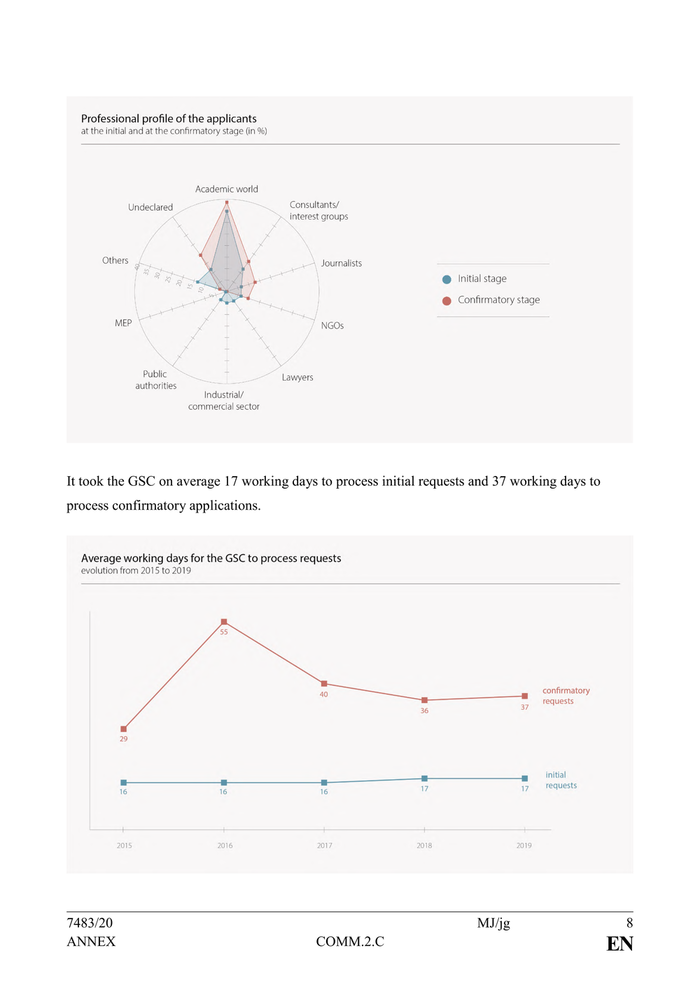
The deadline of 15 working days for processing initial requests was extended for 802 requests, i.e. in 31.5 % of cases. The deadline was extended for all the confirmatory applications. The tables in the annex to the annex give further details on requests for access to documents. II. COMPLAINTS LODGED WITH THE EUROPEAN OMBUDSMAN, OWN- INITIATIVES INQUIRIES, STRATEGIC INITIATIVES BY THE EUROPEAN OMBUDSMAN AND LEGAL ACTION 1. Complaints lodged with the European Ombudsman In 2019, the Council received four complaints related to access to documents and one related to the commercial sponsorship of the Presidency of the Council of the European Union. The complaint received in 2018 and one complaint received in 2017 are included here since there were some developments in those cases in 2019. It has to be noted that for the 2017 complaint mentioned in this report as well as for three out of the four complaints on access to documents received in 2019, the Ombudsman concluded that there was no maladministration on behalf of the Council. Complaint 1955/2017/THH This complaint, received on 13 November 2017, concerns the Council's refusal to grant more than very limited partial access to a number of opinions of the Article 255 Panel on Judicial Appointments to the Court of Justice of the EU and the General Court of the EU. On 11 December 2017, the Ombudsman's services carried out an inspection, which was limited to the favourable opinions issued by the Panel. A report of this inspection was sent by the Ombudsman's services to the Council. Another meeting with the Ombudsman's services took place on 11 June 2018 and a meeting report was sent by the Ombudsman's services to the Council on 21 June 2018. 7483/20 MJ/jg 9 ANNEX COMM.2.C EN
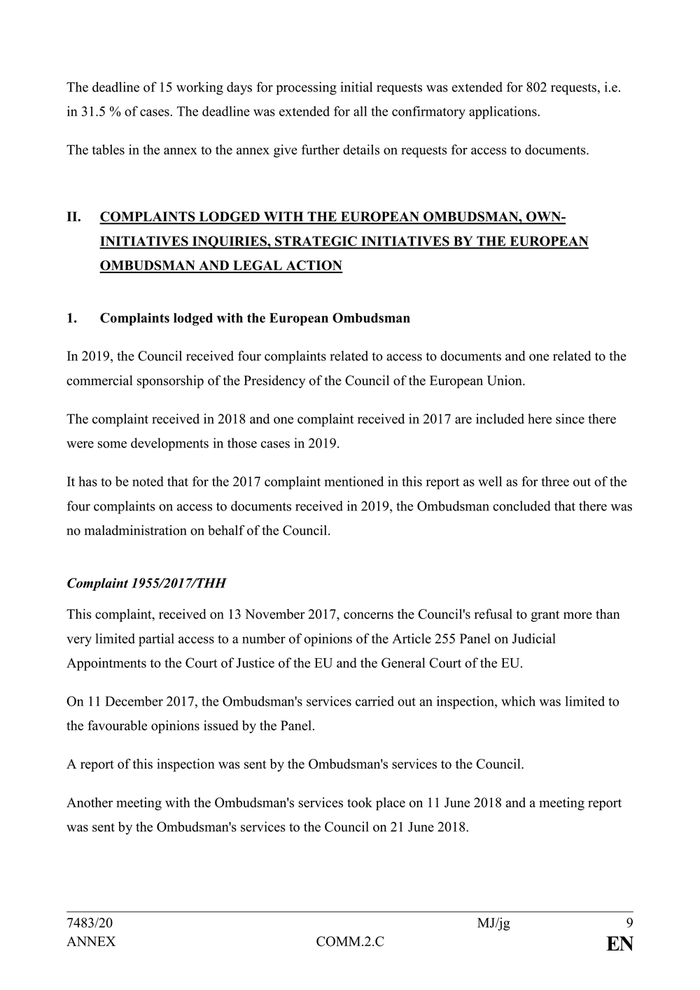
On 23 May 2019, the Ombudsman informed the Council of her decision in this case. The Ombudsman considered that the overriding public interest in this case lies in protecting the Panel’s decision-making process and concluded that the Council was justified in refusing to grant full public access to the opinions of the Panel. Based on these considerations, the Ombudsman found that there was no maladministration by the Council and decided to close the case. Complaint 1946/2018/KR This complaint, received on 19 December 2018, concerns the publication of information about meetings between the President of the European Council and/or members of his Cabinet and interest representatives. A meeting with the Ombudsman's representatives took place on 25 February 2019. A report of that meeting was sent by the Ombudsman's services to the GSC on 28 March 2019 and subsequently to the complainant. In her decision of 18 June 2019, the Ombudsman made suggestions to the Council for the improvement of current practices and invited the Council to inform her, by 30 September 2019, of any action taken in relation to her suggestions. On 1 October 2019, the Secretary General of the Council sent a reply informing the Ombudsman that the matter would be brought to the attention of the new President of the European Council who would decide on the appropriate follow-up after taking-up office on 1 December 2019. By letter of 10 October 2019, the Ombudsman asked the Secretary General of the Council to provide an assessment as regards her suggestions for improvements. At the time of publication of this report, the matter was still under consideration and any developments were still to be notified to the Ombudsman by the General Secretariat of the Council. 7483/20 MJ/jg 10 ANNEX COMM.2.C EN
